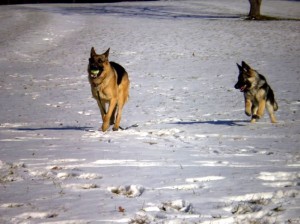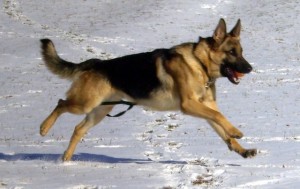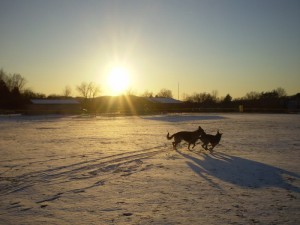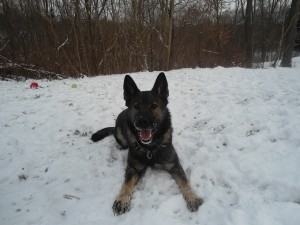Winter precautions for your dog(s)
It’s that time of year already! While many dogs love the cold weather and playing in the snow, there are a few things to prepare and lookout for that come along with the snow and cold temperatures.
1. Wintertime can be hard on your dog’s paws. They are susceptible to drying, cracking, frostbite, and chemical burns (salt). There are many protective balms available to help avoid these issues. Musher’s Secret (http://musherssecret.net/) is my favorite; you can apply it directly on your dog’s paws to help protect them.
Boots are another good protective option for your dog’s paws. Keep in mind they might dislike them at first, but *usually* they get used to them and don’t mind wearing them around. I personally find the balm easier to use, but some people swear by their dog’s booties!
Keep the hair on the underside of your dog’s paw trimmed in the winter, to prevent ice balls from forming around the pads. Some dogs don’t grow excess hair underneath their paws, so you don’t have to worry about it.
 Buy a pet friendly ice melt for use on your sidewalks and driveway at home! Many de-icers are toxic. If you can avoid walking on roads and sidewalks treated with salt, do so. If not, make sure you always wipe off your dog’s paws with warm water after a walk. Discourage your dog from eating snow near roads and sidewalks that have been treated with salt.
Buy a pet friendly ice melt for use on your sidewalks and driveway at home! Many de-icers are toxic. If you can avoid walking on roads and sidewalks treated with salt, do so. If not, make sure you always wipe off your dog’s paws with warm water after a walk. Discourage your dog from eating snow near roads and sidewalks that have been treated with salt.
If you notice your dog holding their paws up off the ground abnormally at any time while on a walk or playing in the snow, time to call it and head back inside!
2. Anti-freeze is very toxic and there is a high mortality rate when ingested. The sweet smell attracts dogs. If you use anti-freeze, lock it away in a vault after use. There are alternatives to anti-freeze also (propylene glycol). If you suspect in the slightest your dog could have ingested anti-freeze, get to the vet immediately!
3. Arthritis tends to be worse in cold weather. If you notice your dog become stiff, or taking longer to get up and down, you might want to have an x-ray done to determine if it is due to arthritis. There are many things you can do to help ease the pain from arthritis in your dog. Moderate exercise, weight control, supplements, acupuncture are just a few.
4. Be careful not to let your d og run on any icy spots. They can twist or sprain a muscle, or break a bone if they run and slip on ice the wrong way! If it is an icy day, be very careful!! Dogs also don’t realize what thin ice is. Be careful around frozen lakes, or ponds! Training your dog to walk on a loose leash is important all year round, but especially in the wintertime when you don’t want your dog pulling you around on the snow and ice.
og run on any icy spots. They can twist or sprain a muscle, or break a bone if they run and slip on ice the wrong way! If it is an icy day, be very careful!! Dogs also don’t realize what thin ice is. Be careful around frozen lakes, or ponds! Training your dog to walk on a loose leash is important all year round, but especially in the wintertime when you don’t want your dog pulling you around on the snow and ice.
5. For small dogs, or dogs with a short, tight or single layer coat, be careful having them outside for too long of a period at a time. Sweaters can be very important for some breeds of dogs. If your dog is shivering, time to head back inside! If your dog is small, and the snow accumulation is taller than them, you will have to shovel out a pathway or potty and play area for them outside.
6. Fireplaces and space heaters can be attractive to some dogs, make sure that they don’t lie too close to these and get burned! All fireplaces should have a grate or a door of some sort. Be careful your dog doesn’t knock over a space heater, which could be a fire hazard for the entire household. Never leave a space heater on with a dog around unsupervised!
Keep these things in mind when you head outside with Fido to play a game of snowball fetch!